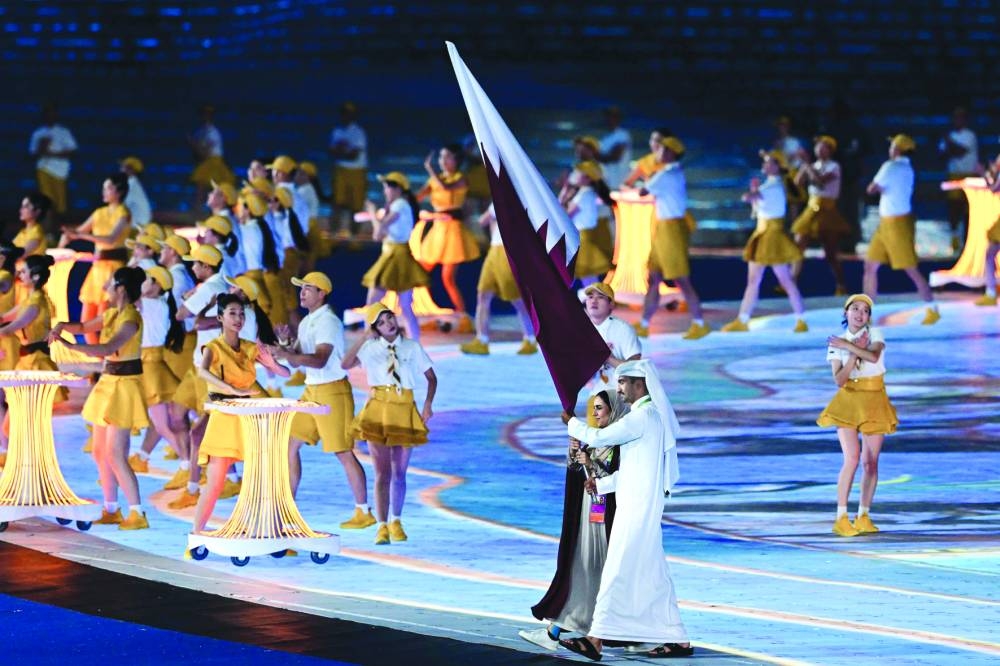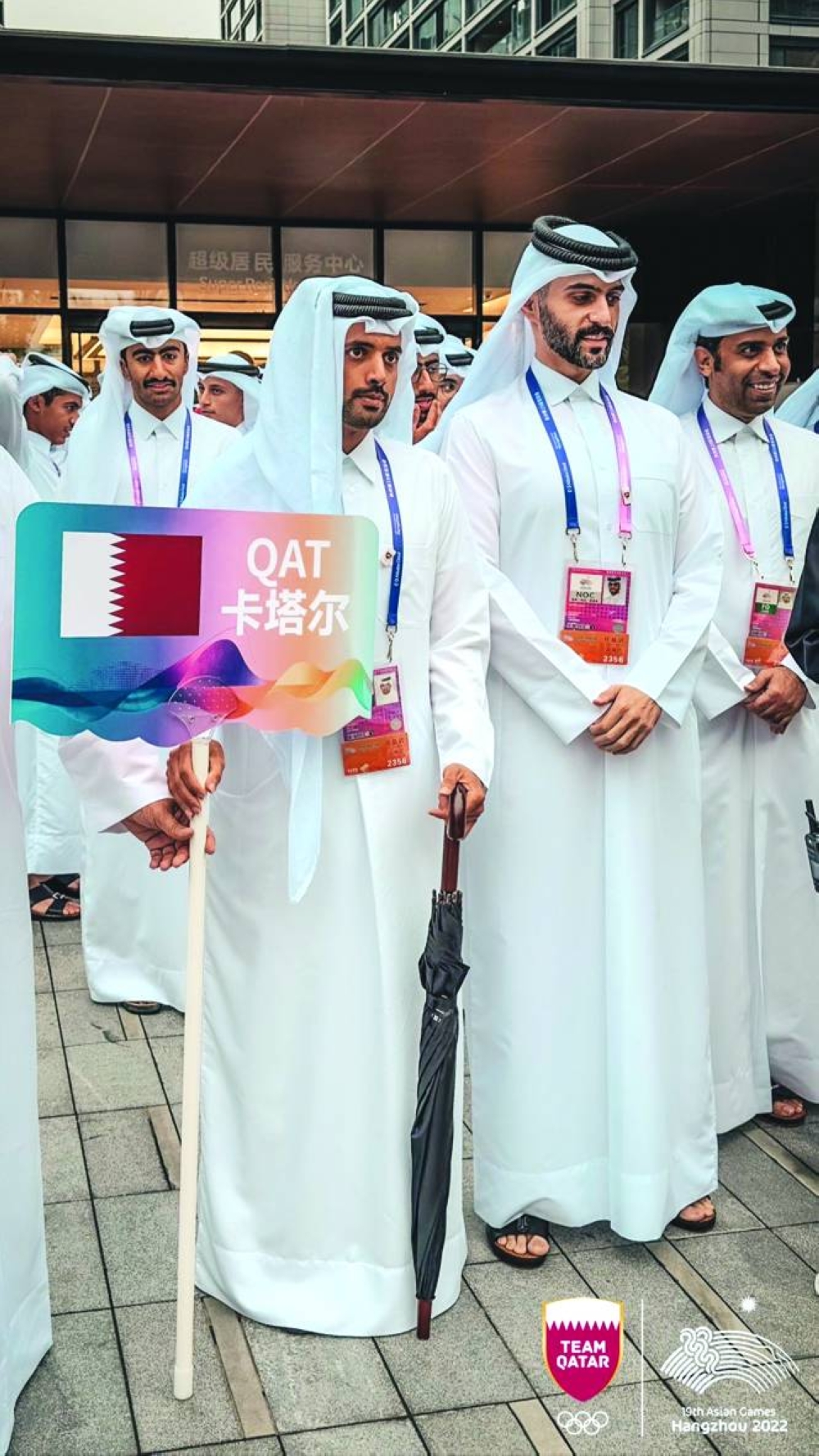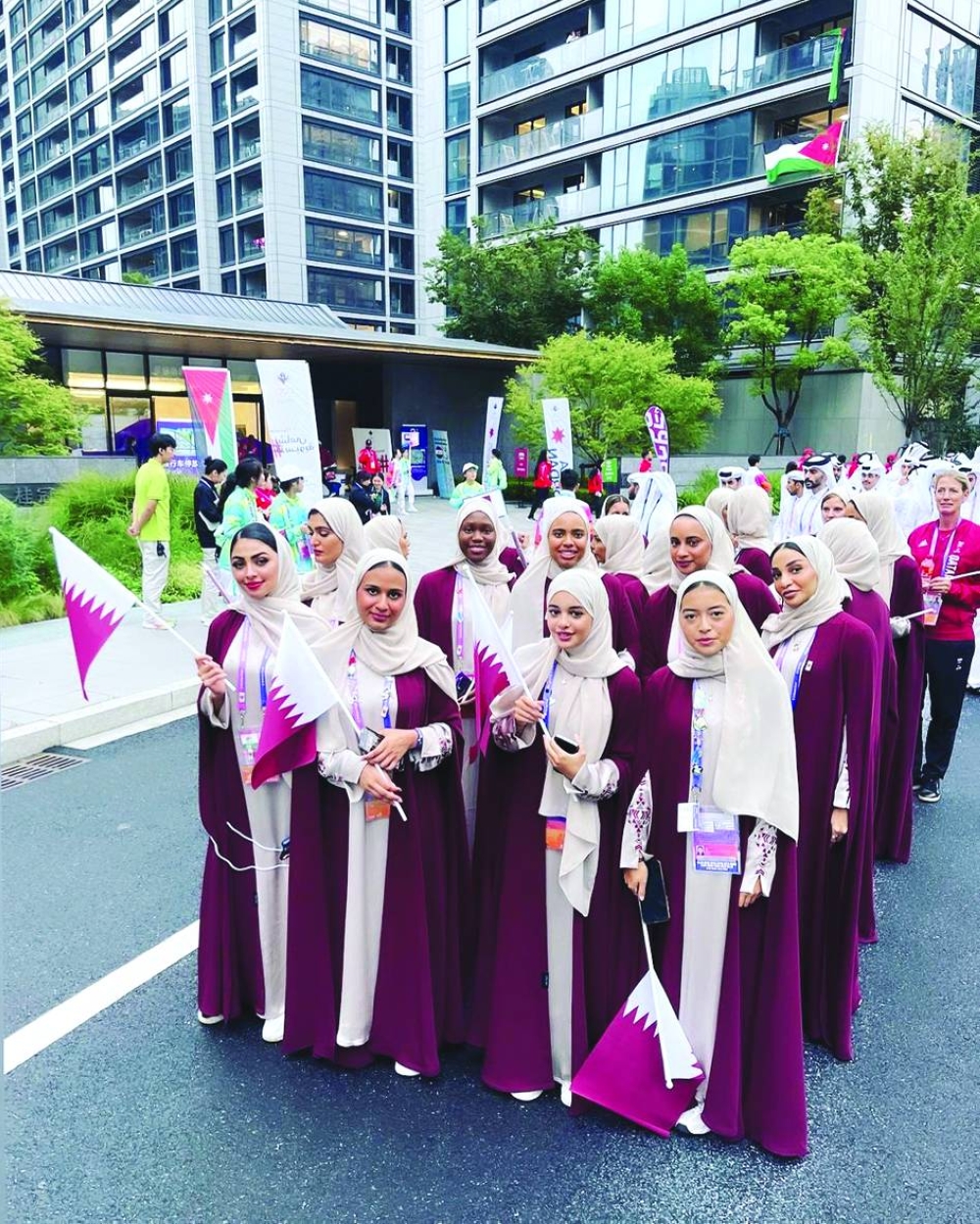The 19th Asian Games was declared open by Chinese President Xi Jinping after a colourful ceremony in Hangzhou on Saturday, launching a two-week sporting extravaganza that boasts more athletes than the Olympics.
After being delayed by a year because of China’s now-abandoned zero-Covid policy, more than 12,000 competitors from 45 nations and territories will battle it out in 40 sports.
Led by their flag bearers in triathlete Tamim Jamal al-Kuwari and dressage rider Maryam al-Buainain, Qatar’s contingent walked out into the 80,000-capacity Hangzhou Olympic stadium, with Qatar Olympic Committee (QOC) President HE Sheikh Joaan bin Hamad al-Thani watching from the stands.
The opening ceremony was also attended by Second Vice-President of the QOC Dr Thani bin Abdul Rahman al-Kuwari, Secretary-General Jassim bin Rashid al-Buainain and other officials.
Qatar has sent a strong 185-athlete contingent, who will compete in 27 events: archery, athletics, basketball, boxing, chess, cycling, electronic sports, equestrian, football, fencing, gymnastics, golf, handball, jiu-jitsu, karate, windsurfing, squash, swimming, tennis, taekwondo, triathlon, table tennis, volleyball, 3×3 basketball, beach volleyball and weightlifting.
Qatar – which won 13 medals, including 6 gold, 4 silver and 3 bronze at 2018 Asiad in Jakarta and Palembang – is hoping for its best medal haul ever. The nation’s strongest gold medal hope is from Olympic champions – Mutaz Barshim in high jump and Fares Ibrahim in weightlifting. The handball and volleyball team and beach volleyball pair Cherif Younousse and Ahmed Tijan are also strong contenders for gold.
Today, the spikers face Pakistan in the quarter-finals, while the 2018 gold medallists Younousse and Tijan take on Oman’s Haitham al-Shereiqi and Ahmed al-Hosni in the round of 16 at the Ningbo Banbianshan Court. Qatar’s second beach volleyball duo Mahmoud Essam and Abdullah Naseem are also up against a Chinese pair in the last 16.The handball team will play their first Group B match against Hong Long at the Zhejiang Gongshang University Sports Centre, as they gear up to defend the gold they have won in the last two editions. Qatar athletes will also be in action today in swimming, tennis, fencing, Esports and taekwondo.
high-tech opening ceremonyMeanwhile, the opening ceremony in the Eastern city of Hangzhou was spectacular and at times raucous, which organisers hope will lift the mood in a nation struggling with an economic slump.
Spectators in the city’s 80,000-capacity stadium let out a huge roar as Xi was introduced and walked in to sit with visiting dignitaries including International Olympic Committee President Thomas Bach.
“Finally we can gather for the 19th Asian Games,” Raja Randhir Singh, acting president of the Olympic Council of Asia, told the crowd to more cheers. “The one-year postponement was unprecedented in OCA history,” he added.
After the Chinese flag was brought out, the first team out was Afghanistan, whose female athletes, based abroad due to sport for women being banned by the Taliban, walked together with their male counterparts. Their flagbearers carried the tri-colour flag for Afghanistan which is used by international resistance movements and shunned by the Taliban.
Several teams including Chinese Taipei were vocally welcomed by the spectators, but none more than the home team, whose athletes are expected to dominate the medals table once again.
They also mark a stark contrast to the cheerless Beijing 2022 Winter Olympics which took place under China’s strict zero-Covid conditions which lasted for nearly three years from January 2020 until late 2022. In an often spell-binding ceremony intended to burnish Hangzhou’s status as one of China’s centres of technology and creativity, dozens of balletic dancers hovered above a digitally-projected lake in the wake of a flotilla of sail-boards.
In a modern take on the traditional lighting of the cauldron, a huge, digitally animated torchbearer “ran” the length of the stadium before settling to loom above the actual torch-bearer, China’s Olympic champion swimmer Wang Shun.
In synch, the pair lit a huge, multi-pronged cauldron, prompting another bout of cheering and soon after, a digital firework display. But many of those not lucky enough to get a ticket grumbled about disruption.
A sizeable “traffic control area” around the city’s Olympic stadium were blocked off, at least one metro station was shut and other Games centres were closed and deliveries were disrupted on Saturday.
Organisers have not disclosed spending on the Games, though the Hangzhou government has said it spent more than 200bn yuan ($30bn) in the five years through 2020 on transport infrastructure, stadiums, accommodation and other facilities.
Organisers hoped a high-tech opening ceremony on Saturday will help drum up excitement for the Games. Interest at home has been muted as the economy sputters and some question the cost of hosting the mega-event.
Dozens of smiling volunteers greeted arriving journalists in Hangzhou this week, with some expressing relief that the event was finally getting started. The official slogan of the event, “Heart to Heart, @Future”, represents the goal of uniting the people and countries of Asia through these games, officials have said, but geopolitical tensions and rivalries threatened to overshadow that effort this week.
ESports to make Asiad debut
ESports will make its debut as a medal event at the Games, in what is seen as a step towards inclusion in the Olympics. There will also be regional specialities including dragon boat racing, the Chinese martial art wushu and kabaddi.
Nine sports – among them boxing, break dancing and tennis – will serve as Asia qualifiers for next year’s Paris Olympics. A sprinkling of world and Olympic champions adds some stardust, including India’s javelin king Neeraj Chopra, Qatari high jumper Mutaz Essa Barshim and Chinese swimming royalty Qin Haiyang and Zhang Yufei.
Olympic Council of Asia honorary life vice-president Wei Jizhong said having so many sporting disciplines was about giving opportunity to as many athletes as possible. “We are open to all. This means our Games are not concentrated only for elite sportspeople,” he said.
Although the Games officially opened on Saturday, sports such as football, cricket, volleyball and table tennis had already begun.
The Games will be staged at 54 venues – 14 newly constructed – mostly in Hangzhou but also extending to cities as far afield as Wenzhou, 300 kilometres (180 miles) south.
Sport
Qatar eyes best medal haul at biggest-ever Asian Games
Led by flag bearers al-Kuwari and al-Buainain, Qatar’s contingent walked out at opening ceremony

Qatar’s flag bearers Tamim Jamal al-Kuwari and dressage rider Maryam al-Buainain walk into the Hangzhou Olympic stadium, during the opening ceremony of the Asian Games in Zhejiang, China, on Saturday. (AFP)



Qatar’s shooter Nasser Saleh al-Attiyah (centre), Qatar Shooting & Archery Association President Mishaal Ibrahim al-Nasr (second left) and other officials pose in Hangzhou.
